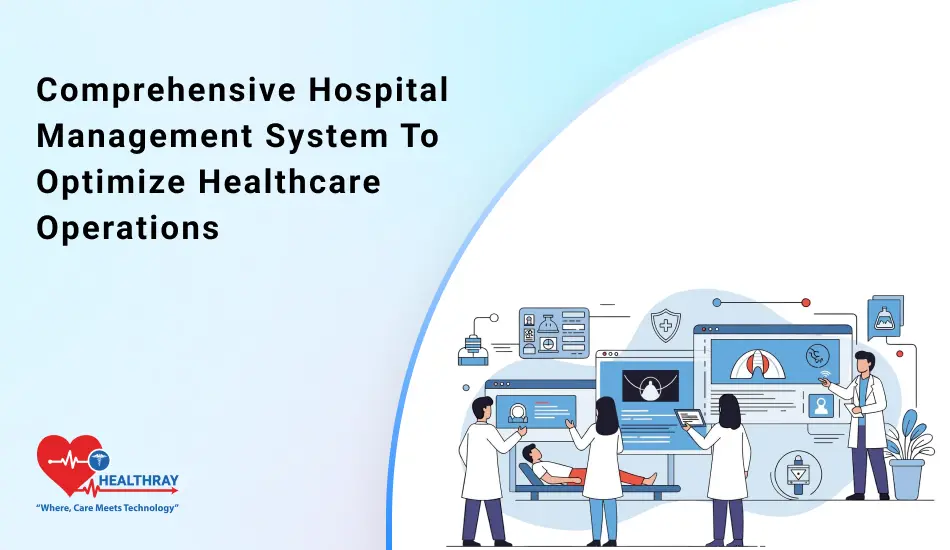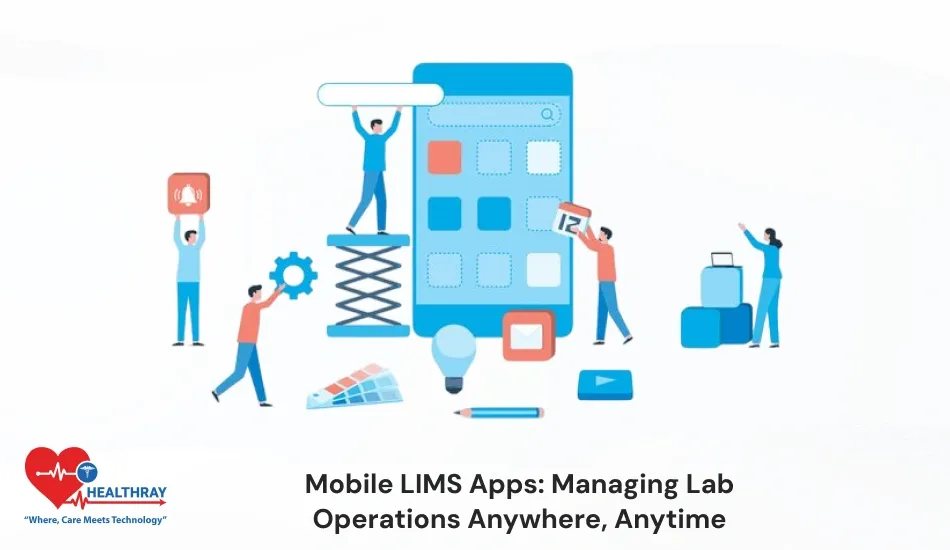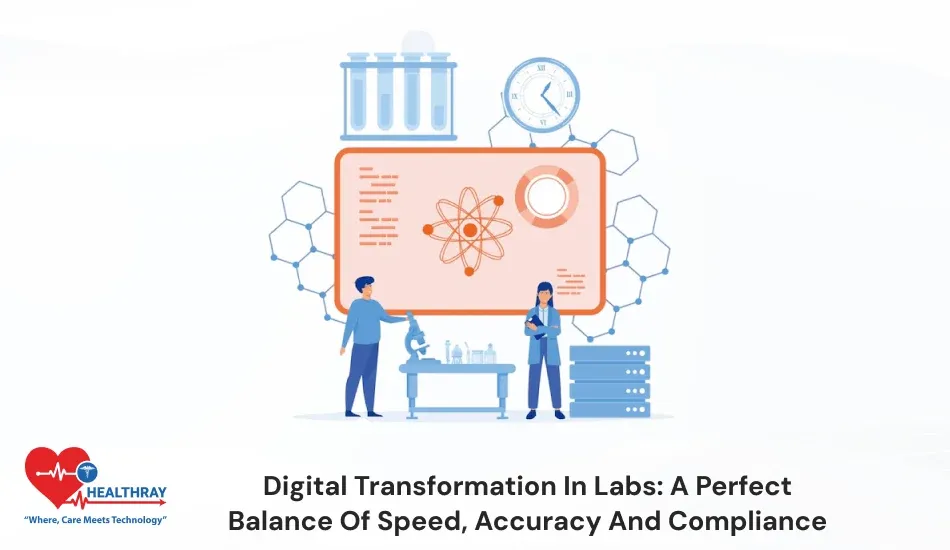Quick Summary
An avant-garde digital healthcare solution required to administer complex operations and upgrade clinical facilities. From tracing patient visits to discharge planning, the hospital management is a great solution for all. Meticulously design HMS software after examining the demand of healthcare departments and have a customized system to adjust with future clinical needs. Grasp the knowledge of a hospital management system and learn how it optimizes healthcare operations.
Introduction
In the present-day times, it is intricate to control healthcare operations and requires the modern-day healthcare solution that will become the backbone of hospitals. As the hospital grows, the requirement of a reliable hospital management system also increases. It improves the internal workflows and increases clinical efficiency.
Grabs the patient information from the medical prescription to discharge papers, simplifying to revamp diagnosis processes and assist to monitor the patient journey. Furthermore, it helps to analyze the mistakes that are made in the patient treatment and mark down in the digital system, assisting to discuss in the specialists groups and create a well-defined solution.
The comprehensive hospital software expedits the patient workflows, improves physician practice, and reduces the colossal amount of expenses. Furthermore, it helps to monitor healthcare finances and analyzes the healthcare stock from a single view. Minimizing the transcription mistakes, increasing safety, and supporting to monitor inventory.
Top Functionalities of The Comprehensive Hospital Management System
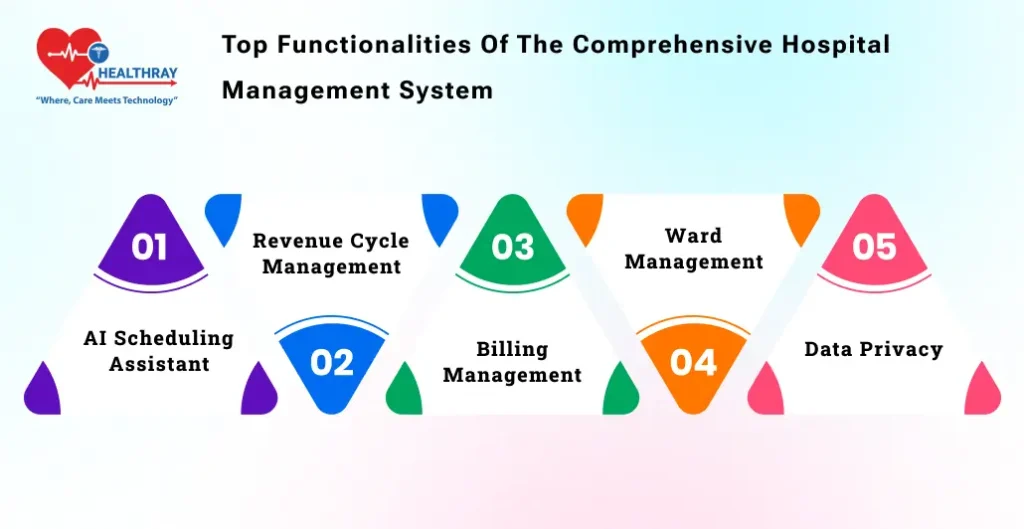
The hospital management system eliminates bootlenecks of patient journey and healthcare practice. Administrates the clinical record securely, improves the documentation speed, and increases healthcare service quality. Furthermore, let’s have a profound understanding of the functionalities of the hospital information management system.
AI Scheduling Assistant
In the modern healthcare landscape, there is no need to utilize the conventional approaches for supervising appointments as it is a time-consuming process. Not only takes too much time but also creates lots of mistakes while scheduling.
A trend of easy and swift scheduling with the automated solution annihilate the long queues, manage the high volume of appointment queries, and streamline to do associated booking duties such as cancelling, frequent reminders, and re-scheduling.
Revenue Cycle Management
Whenever healthcare revenue is generated.Then, swiftly collected and recorded in the hospital management system. Keeps the revenue information from the patient registration fees to the payment of medical bills.
Assimilates the insurance receipts and collects claim amounts immediately after inspecting by the insurance company. Furthermore, it smoothly performs an insurance procedure, decreases claim denials, and enhances precision throughout the procedure.
Billing Management
Generate custom invoices and one can make changes based on the new regulations or modern billing trends. Moreover, it is easy to create GST related bills and reckon the total amount of medical services.
Administer the IPD and OPD billing services and can track any of the medical bills. Streamline to edit invoicing information and change the treatment type, mitigating the average medical costs and alerting about billing protocols.
Also, pre-set templates preserve enormous efforts and time. The hospital information management system probes the patient medical services and automatically gets the services amount as it saves in the healthcare software.
Ward Management
If the ward management is not done effectively, more than 20% administrative inefficiency takes place. The hospital management software is the single solution that controls the ward activities and monitors it effortlessly.
Before the admission of patients, analyze the assigned ward and look out for the necessary equipment for performing surgeries or other treatments. It gives the bed information and easy to get the list of empty beds.
It gives you the complete information about beds, nursing duties, and specialists name for the particular treatment. Also, simplify to monitor the movement of patients and ease to replace information as needed.
Data Privacy
Congregated information in the cloud server has no chances of fraud and stealing data. Simplifying to get record accessibility and check whether there is an issue in any entry or not. This is for the recorded information but the current data also maintained the strict healthcare protocols.
If you want to protect your healthcare data. Then, never using the outdated system as they are not allowing for automatic security updates. Modern emerging technologies examine the mail and remove the fraudulent one.
Why Require HMS Software In the Digital Age?
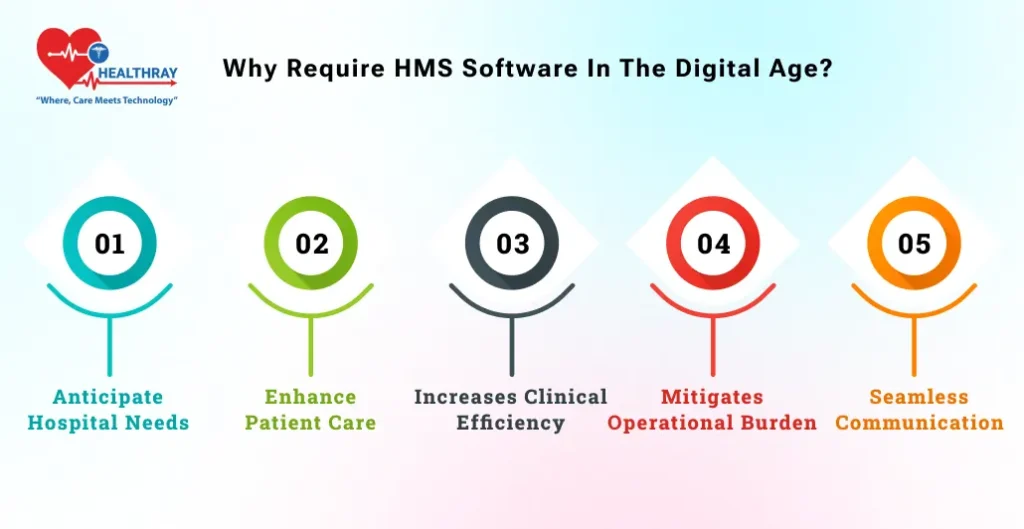
In the digital age, precision and robust care is paramount in the healthcare organization. To cover up, there is a requirement of the secure hospital management system solution. Aids to track appointment information, avoids errors, and upgrades the service delivery. If you aspire to explore more, then watch out for the subsequent points.
Anticipate Hospital Needs
- Harnessing the modern technologies to inspect the healthcare histories and improves the mechanism of decision-making.
- It creates cohesive virtual reports that assists to uncover the covert pattern and precise forecasting of hospital requirements.
- The integrated algorithm uses the prevalent and historical healthcare information to know the future requirements, assisting to identify the medical risks early and decrease costs.
- It means you can take the necessary steps earlier before the demand arises, reducing the employee efforts and hospital expenses.
Enhance Patient Care
The manual healthcare procedure causes inordinate delay, which is not acceptable in the healthcare organization. As we know that quick technologies are required to expedite the whole procedure. None of the software gives excellence than the hospital management system.
Optimizing the whole procedure from registration to discharge as each of the duties perform with absolute precision and advanced technologies. Additionally, it provides patient self service and reduces service errors.
Step towards digital era with our healthcare solution
Revamp your hospital facilities and embrace change for better healthcare management. Ease in managing and organizing large medical datasets leads to effective analysis. Seize the opportunity now!
Increases Clinical Efficiency
Optimizes the duties of clinical departments and increases seamless coordination among them. Simplifying scheduling process, preparing lengthy documents within seconds, controlling medical inventory, and administering clinical revenue.
A patient ID helpful to track their documents and where their treatment lies. It optimizes the reimbursement cycle due to streamlining the steps of insurance claims and administering all necessary records in the digital format.
Mitigates Operational Burden
Administering the range of administrative responsibilities in the easy manner from maintaining the registration records to improve the discharge procedure. Furthermore, it decreases inordinate delays, reduces any kind of mistakes, and improves the document quality.
While you create the medical invoices, there is a requirement of robust coding skills and remember each of the invoicing protocols. Additionally, it increases data accuracy and renders effective security.
Seamless Communication
Interdepartmental coordination is essential to reduce confusion, enhance nursing care, improve patient outcomes, and simplify medical procedures. When you share the documents and information, it becomes easier to control the healthcare resources.
Receiving the quick accessibility of patient documents that simplifies to optimize diagnostic processes. Additionally, streamlining to transmit the critical details among specialists teams and easier to make treatment plans.
How To Use the Hospital Information Management System To Optimize Hospital Operations?
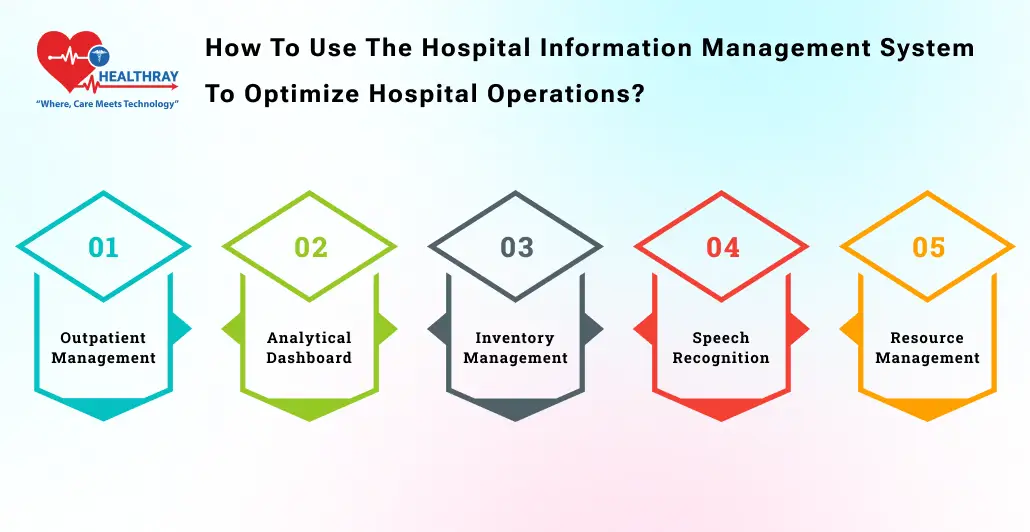
Recent research says that more than 30% of the operational time invested in the patient documentation. Therefore, it automatically avoids the paperwork in the healthcare institutions and decreases the risks as well as maintains precision. It optimizes staff duties, tracks clinical information, analyzes the relevant data accurately, and manages healthcare invoices. Let’s discuss how the hospital management system optimizes clinical operations :
Outpatient Management
Takes the patient responsibility from consultation management to collect payments. It does not discharge activities as patients are not admitted to the healthcare organization. Furthermore, it optimizes the patient services and increases their satisfaction.
It tracks patient records effortlessly, administers medical bills, and simplifies insurance claims. Also, the hospital information management system renders immediate notifications and improves the communication system.
Analytical Dashboard
Collecting real-time medical information and depicts the right way, making it accessible to all departments. The hospital management system takes client information and processes data with the advanced algorithms.
Furthermore, it clears any type of mistakes and aggregate information to fill the omitted space. The analytical reports itself says the judgement but you have to meticulously examine documents.
Inventory Management
Oversees the healthcare stock from the healthcare management system and gives out the precise analytical reports for better stock decisions. The information process to create formulas and that helps to predict the future inventory, when you have the current stock units.
The AI-powered hospital management system saves money, minimizes burden, arranges stock efficiently, increases patient care, and avoids over or understocking.
Speech Recognition
The powerful feature that translates the employee speech to text and easily runs at the time of performing the duty. Furthermore, it is a revolutionary tool that modifies the document management and enhances accuracy.
Sometimes, when the doctor speaks in the low voice but still, the system catches the voice and writes text with accuracy. It eradicates the accessibility hurdles and also maintains privacy throughout the clinical workflows.
Resource Management
A significant stress increase when you don’t manage the healthcare resources as you want. It is the base reason to increase security and decrease costs. Moreover, it helps to distribute collected finance appropriately, optimizes staff services, and tracks medical inventory.
When you accurately administer healthcare resources, it decreases the administrative waste, improves operational efficiency, decreases errors, simplifies to track healthcare equipment, and reduces costs.
Upgrade Patient Service With The Smart Hospital Information Management System
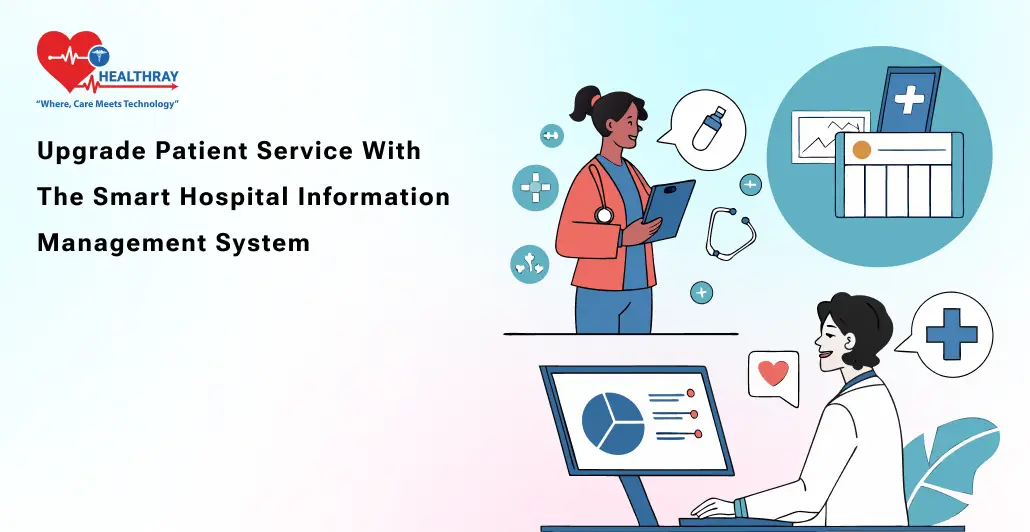
Managing healthcare institutions is not that easy and somewhat complicated in nature. Has multiple obstacles while performing the clinical duty and supports financial control. However, the hospital management system is a true solution and escapes from the multiple hurdles. Creating the precise documentation, improves resource efficiency, and decreases the error rate.
Modern healthcare software improves the staff management process, optimizes the financial mechanism and predicts the medical inventory from the available stock and current demand. Increases data security because the integrated algorithms are able to cope up with the authoritative protocols.
It handles the biggest hurdle that is data fragmentation but the hospital management system congregates details that keep in pieces. Also, it stores the hard copy of a patient prescription. Furthermore, provide robust communication among care teams. The cloud-based server aids to receive information from anywhere and transmit to anyone.
Conclusion
Healthcare institutions come with many hurdles such as client data fragmentation, documentation errors, inordinate delays, and difficulty to know the status of records. The hospital management system has the top functionalities such as AI -based scheduling, financial management, ward management, invoicing management, and data privacy. Furthermore, it increases client care, enhances operational efficiency, predicts clinical needs, and has seamless coordination. It optimizes healthcare operations because it administers outpatient services, analyzes data, administers stock, voice recognition, simplifies inpatient services, and manages healthcare resources.
